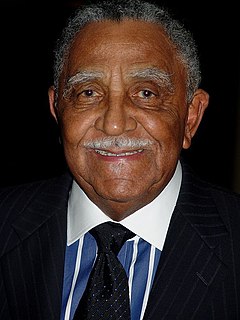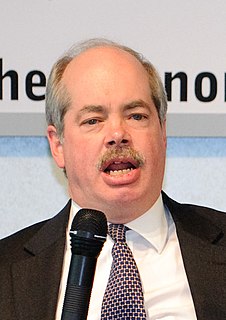A Quote by Wendell Berry
With its array of gadgets and machines, all powered by energies that are destructive of land or air or water, and connected to work, market, school, recreation, etc., by gasoline engines, the modern home is a veritable factory of waste and destruction. It is the mainstay of the economy of money. But within the economies of energy and nature, it is a catastrophe. It takes in the world's goods and converts them into garbage, sewage, and noxious fumes-for none of which have we found a use.
Related Quotes
You know that the air and water are being polluted, as is everything we touch and live with, and we go on corrupting the nature that we need. We don't realize we have a commitment to God to take care of nature. To cut down a tree, to waste water when there is so much lack of it, to let buses poison our atmosphere with those noxious fumes from their exhausts, to burn rubbish haphazardly-all that concerns our alliance with God.
We no longer see the world as a single entity. We've moved to cities and we think the economy is what gives us our life, that if the economy is strong we can afford garbage collection and sewage disposal and fresh food and water and electricity. We go through life thinking that money is the key to having whatever we want, without regard to what it does to the rest of the world.
Will biofuel usage require land? Absolutely, but we think the ability to use winter cover crops, degraded land, as well as using sources such as organic waste, sewage, and forest waste means that actual land usage will be limited. Just these sources can replace most of our imported oil by 2030 without touching new land.
There are some things in the world we can't change- gravity, entropy, the speed of light, and our biological nature that requires clean air, clean water, clean soil, clean energy and biodiversity for our health and well-being. Protecting the biosphere should be our highest priority or else we sicken and die. Other things, like capitalism, free enterprise, the economy, currency, the market, are not forces of nature, we invented them. They are not immutable and we can change them. It makes no sense to elevate economics above the biosphere.
Until the 19th century, the term 'to consume' was used mainly in its negative connotations of 'destruction' and 'waste'. Tuberculosis was known as 'consumption', that is, a wasting disease. Then economists came up with a bizarre theory, which has become widely accepted, according to which the basis of a sound economy is a continual increase in the consumption (that is, waste) of goods
Improved energy productivity and renewable energy are both available in abundance—and new policies and technologies are rapidly making them more economically competitive with fossil fuels. In combination, these energy options represent the most robust alternative to the current energy system, capable of providing the diverse array of energy services that a modern economy requires. Given the urgency of the climate problem, that is indeed convenient.
Everyone has a self-destructive nature in them. It's whether you feed it or not. You don't have to be a pop star to feel connected to destruction or self-destruction. But self-destruction is self-obsession, and self-obsession is not really possible if you're engaged in raising children. And if you have a spiritual life, you're constantly being asked to see yourself as one small fragment in the bigger picture.
You can have a strong economy or you can help the environment, but you can't do both at the same time. That's ridiculous. In fact, as a sustainable vision for a healthy economy has to involve changing our energy policy and changing with respect to the natural world. Because we're hitting nature's thresholds, we're hitting nature's limits with respect to water and crop yields and energy use and fossil fuels heating the atmosphere at the same time we're past global peak and running out of that.
What is it about a work of art, even when it is bought and sold in the market, that makes us distinguish it from . . . pure commodities? A work of art is a gift, not a commodity. . . works of art exist simultaneously in two “economies”, a market economy and a gift economy. Only one of these is essential, however: a work of art can survive without the market, but where there is no gift, there is no art.
Money is not a part of the visible sector of the economy; people do not consume money. Money is not a physical factor of production, but rather a yardstick for measuring economic input, economic outtake and the relative values of the real goods and services of the economic world. Money provides a method of measuring obligations, rights, powers and privileges. It provides a means whereby certain individuals can accumulate claims against others, or against the economy as a whole, or against many economies.
Militarism is the most energy-intensive, entropic activity of humans, since it converts stored energy and materials directly into waste and destruction without any useful intervening fulfillment of basic human needs. Ironically, the net effect of military, as opposed to civilian, expenditures is to increase unemployment and inflation.
The money economy thus leaves a large ecological footprint, defined as the amount of land and resources required to meet a typical consumer's needs. For example, with only about 4% of the world's population, the United States, the largest money economy, consumes in excess of one-quarter of the world's energy and materials and generates in excess of 25 percent of the world's greenhouse gas emissions.






































